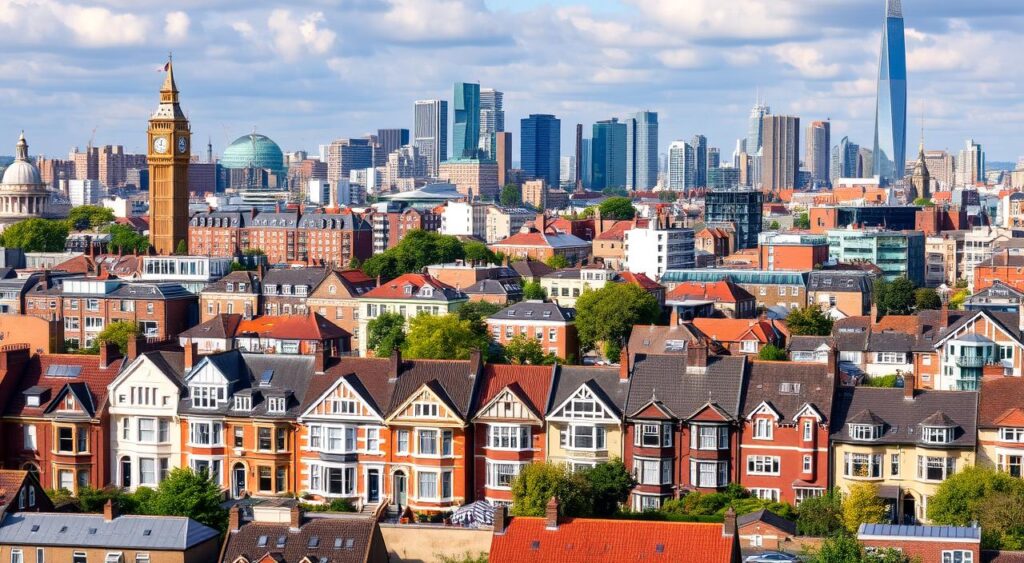
The UK is a magnet for global talent, making it key to know salaries and living costs for visa jobs. This guide explores the UK job market, salary differences by region, and living costs in major cities. It’s perfect for skilled workers or entrepreneurs looking at the UK. You’ll get the info to decide if life in the UK fits your budget.
Key Takeaways
- Explore the most in-demand visa-sponsored positions in the UK and their average salary ranges.
- Understand the regional variations in salaries and cost of living across major UK cities.
- Analyze the impact of housing, transportation, utilities, and other essential expenses on your monthly budget.
- Uncover the tax implications and healthcare considerations for foreign workers in the UK.
- Discover the potential for savings and financial planning as a visa-sponsored employee in the UK.
Understanding the UK Job Market for Visa Holders
The United Kingdom offers a wide range of career opportunities for visa holders. The job market has many in-demand positions, competitive salaries, and regional differences. These factors can greatly affect how much you can earn. Whether you’re experienced or just starting out, it’s important to understand the UK job market well.
Most In-demand Visa-Sponsored Positions
Recent reports show that certain jobs are highly sought after in the UK. These include:
- Information Technology (IT) Professionals: Software developers, data analysts, cybersecurity experts, and IT project managers are in high demand.
- Healthcare Specialists: Nurses, doctors, and healthcare administrators are essential to the National Health Service (NHS) and private healthcare providers.
- Engineering and Technical Roles: Civil, mechanical, and electrical engineers, as well as technical professionals in the manufacturing and energy sectors, are highly valued.
- Business and Financial Services: Accountants, financial analysts, management consultants, and professionals in banking and finance are in steady demand.
Average Salary Ranges by Industry
The salaries for visa-sponsored jobs in the UK vary by industry. Here are the average salary ranges:
| Industry | Average Salary Range |
|---|---|
| Information Technology | £40,000 – £65,000 |
| Healthcare | £30,000 – £55,000 |
| Engineering | £35,000 – £60,000 |
| Business and Finance | £45,000 – £75,000 |
Regional Salary Variations
Salaries for visa-sponsored jobs also vary by region. London and the South East tend to offer higher salaries due to the cost of living. Other parts of the country might have more competitive offers. Knowing these differences can help you choose the right career path and location for your goals.

Housing Costs Across Major UK Cities
Planning your move to the UK as a visa holder? Knowing the housing costs in different cities is key. The UK’s property market changes a lot, with prices varying by location. This section will look at the housing in major UK cities, helping you plan your budget.
London is one of the priciest cities for housing. Recent data shows the average monthly rent for a one-bedroom apartment in central London is about £1,800. A three-bedroom flat can cost over £3,000. The high demand and limited supply make living in London very expensive.
Other big cities like Manchester and Birmingham are more affordable. In Manchester, a one-bedroom apartment costs around £800 a month. A three-bedroom home usually costs between £1,100 and £1,400. Birmingham, the UK’s second-largest city, has even lower prices. A one-bedroom flat averages £600 a month, and a three-bedroom home is about £950.
| City | Average 1-Bedroom Rent | Average 3-Bedroom Rent |
|---|---|---|
| London | £1,800 | £3,000+ |
| Manchester | £800 | £1,100 – £1,400 |
| Birmingham | £600 | £950 |
Remember, these prices are just estimates. Actual costs can change based on location, property size, and amenities. When moving to the UK, research the housing market in your chosen city. This will help you budget for housing costs accurately.

Is UK Affordable? Comparing Salaries and Living Costs for Visa-Sponsored Jobs
The UK is a top choice for professionals looking for visa-sponsored jobs. But, is it affordable? We’ll look at monthly budgets, taxes, and healthcare costs to find out.
Monthly Budget Breakdown
A visa-sponsored worker in the UK might spend on:
- Rent or mortgage payments
- Utility bills (electricity, gas, water, internet)
- Council tax
- Groceries and meals
- Transportation (public transit or car expenses)
- Insurance (health, life, car)
- Entertainment and leisure activities
Tax Implications for Foreign Workers
Taxes can affect how much money visa workers take home in the UK. They pay UK income tax and National Insurance. Knowing the tax system helps keep a good lifestyle.
Healthcare and Insurance Expenses
Good healthcare is important for visa workers in the UK. The NHS offers free or low-cost care. But, private health insurance might be needed for some treatments. The cost of this insurance varies, so it’s key to research and include it in the budget.
By looking at all living costs in the UK, visa workers can decide if it’s affordable. It’s important to balance salary with monthly expenses for a successful move.
“The UK offers exceptional career opportunities for visa-sponsored workers, but it’s crucial to understand the financial implications to ensure a comfortable and sustainable lifestyle.”
Transportation and Commuting Expenses
Living and working in the UK can be costly, especially when it comes to getting around. From London’s busy streets to smaller cities, travel expenses vary a lot.
UK public transport costs can quickly add up. Monthly passes for buses, trains, and the London Underground cost between £50 and £200. Some cities offer discounts for students, seniors, and people with disabilities.
Car ownership expenses in the UK are also high. Buying a car, plus maintenance, fuel, and insurance, can cost a lot. The average monthly car cost in the UK is between £200 and £400, depending on the car and location.
To give a better idea, here are the commuting costs in some major UK cities:
| City | Monthly Public Transport Pass | Average Car Ownership Costs |
|---|---|---|
| London | £150 – £250 | £300 – £500 |
| Manchester | £70 – £120 | £200 – £350 |
| Edinburgh | £60 – £100 | £180 – £300 |
| Birmingham | £80 – £130 | £220 – £380 |
These costs are estimates and can change based on many factors. These include where you live, how you travel, and your driving habits. Thinking about your transport options and costs can help you make choices that fit your budget and lifestyle.
Essential Living Expenses: Food, Utilities, and Entertainment
As a visa holder in the UK, knowing your living costs is key. This part talks about food, bills, council tax, and fun activities. These are important for a good budget.
Grocery Shopping Costs
Grocery prices in the UK change based on where you live and shop. A single person’s monthly food bill is usually between £200 and £300. To save money, buy in bulk, choose store brands, and look for sales.
Utility Bills and Council Tax
Utility costs like electricity, gas, and water add up fast. A one-bedroom flat’s monthly bill is about £100 to £150. Council tax, set by your local council, can be £100 to £200 a month. It depends on your home’s value and where it is.
Leisure and Entertainment Spending
Don’t forget to budget for fun and relaxation. Brits spend about £200 monthly on dining out, streaming, gyms, and movies. It’s important to have some money for these things.
Knowing these costs helps you plan better for your time in the UK. It makes sure you have a good and enjoyable stay.
Savings Potential and Financial Planning
As a visa holder in the UK, it’s key to save and plan for your future. The UK has many ways to help you grow your wealth over time. This includes different investment options and savings plans.
Recommended Savings Rates for Expats
Experts say visa holders should save 10-20% of their monthly income. This helps you save for emergencies, retirement, and other big goals. Saving early lets you use the UK’s stable financial system and avoid money problems later.
Investment Opportunities for Expats
- Individual Savings Accounts (ISAs): These accounts let you save and invest up to £20,000 a year. You won’t pay tax on the interest or gains.
- Stocks and Shares: The UK’s stock market has many investment choices. From big companies to new startups, spreading your money can lower risks.
- Real Estate: Investing in UK property can be good for expats. It might grow in value and earn rental income.
Financial Planning Strategies
- Make a detailed budget: Keep track of your income, spending, and savings. This helps you use your money wisely.
- Get professional advice: A financial advisor can help you make the most of your investments and plan for the future.
- Look into tax-efficient options: Use accounts and strategies that save you money on taxes. This can help you save more and pay less in taxes.
By saving and planning smartly, visa holders in the UK can secure their financial future. They can also explore the many investment chances the country offers.
| Investment | Potential Benefits | Considerations |
|---|---|---|
| Individual Savings Accounts (ISAs) | Tax-efficient savings and investment | Annual contribution limit, withdrawal restrictions |
| Stocks and Shares | Potential for capital growth, dividend income | Market volatility, diversification required |
| Real Estate | Rental income, capital appreciation | Upfront costs, property management considerations |
Your financial plan should match your goals, how much risk you can take, and when you need the money. A good financial advisor can help you create a plan. This plan will help you save and invest wisely in the UK.
“Saving for the future is the best way to invest in the present.” – Unknown
Conclusion
The UK offers both chances and hurdles for visa job holders when it comes to money. Salaries for needed jobs might be good, but living costs, especially in big cities like London, can be high.
Whether the UK is right for you depends on your personal situation, career dreams, and money goals. Knowing the differences in salaries, housing, and daily living costs helps you decide if a visa job in the UK is good for you.
Good financial planning, budgeting, and knowing the balance between salary and living costs are key. This helps figure out if the UK is affordable for you as an expat. By considering the important points in this article, you can choose wisely for your personal and career goals.
FAQ
What are the most in-demand visa-sponsored positions in the UK?
In the UK, jobs in tech and engineering, healthcare, finance, and skilled trades are in high demand. These include roles in construction and manufacturing.
What are the average salary ranges for different industries in the UK?
Salaries in the UK vary by industry. Tech and finance jobs usually pay more than those in retail or hospitality. Always check what you can expect based on your field and experience.
How do housing costs differ across major UK cities?
Housing costs vary a lot in the UK. London is the priciest. But, cities like Manchester, Birmingham, and Glasgow offer more affordable housing compared to London.
How can I budget for essential living expenses like food, utilities, and entertainment in the UK?
Budgeting for living in the UK means planning for food, bills, council tax, and fun. These costs add up fast. So, it’s key to know what to expect in your area.
What are the tax implications for foreign workers in the UK?
Foreign workers in the UK face the country’s tax rules. This includes income tax and National Insurance. It’s vital to understand your tax duties to avoid problems.
How can I save and plan financially as a visa holder in the UK?
To save as a visa holder in the UK, set aside some of your income. This helps build wealth for the future, whether you stay in the UK or go back home.






